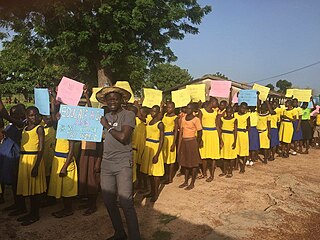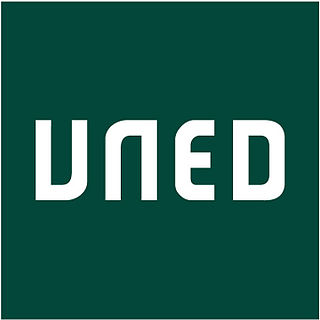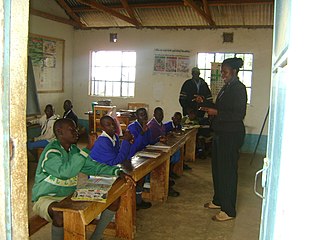The following outline is provided as an overview of and topical guide to education:

An academic discipline or field of study is a branch of knowledge, taught and researched as part of higher education. A scholar's discipline is commonly defined by the university faculties and learned societies to which they belong and the academic journals in which they publish research.
Educational research refers to the systematic collection and analysis of evidence and data related to the field of education. Research may involve a variety of methods and various aspects of education including student learning, interaction, teaching methods, teacher training, and classroom dynamics.
A Praxis test is one of a series of American teacher certification exams written and administered by the Educational Testing Service. Various Praxis tests are usually required before, during, and after teacher training courses in the U.S.
This is an index of education articles.

Inclusion in education refers to including all students to equal access to equal opportunities of education and learning, and is distinct from educational equality or educational equity. It arose in the context of special education with an individualized education program or 504 plan, and is built on the notion that it is more effective for students with special needs to have the said mixed experience for them to be more successful in social interactions leading to further success in life. The philosophy behind the implementation of the inclusion model does not prioritize, but still provides for the utilization of special classrooms and special schools for the education of students with disabilities. Inclusive education models are brought into force by educational administrators with the intention of moving away from seclusion models of special education to the fullest extent practical, the idea being that it is to the social benefit of general education students and special education students alike, with the more able students serving as peer models and those less able serving as motivation for general education students to learn empathy.

The National Distance Education University is a distance learning and research university founded in 1972 and is the only university run by the government of Spain. The headquarters is located in Madrid, with campuses in all Spanish autonomous communities. There are 14 study centers and 3 exam points in 13 countries in Europe, the Americas and Africa. The University awards undergraduate and postgraduate degrees, as well as non-degree qualifications such as diplomas and certificates, or continuing education units.
Bilingual–Bicultural or Bi-Bi deaf education programs use sign language as the native, or first, language of Deaf children. In the United States, for example, Bi-Bi proponents state that American Sign Language (ASL) should be the natural first language for deaf children in the United States, although the majority of deaf and hard of hearing being born to hearing parents. In this same vein, the spoken or written language used by the majority of the population is viewed as a secondary language to be acquired either after or at the same time as the native language.

Education structure in Tanzania is provided by both the public and private sectors, starting with pre-primary education, followed by primary, secondary ordinary, secondary advanced, and ideally, university level education. Free and accessible education is a human right in Tanzania. The Tanzanian government began to emphasize the importance of education shortly after its independence in 1961. Curriculum is standardized by level, and it is the basis for the national examinations. Achievement levels are important, yet there are various causes of children not receiving the education that they need, including the need to help families with work, poor accessibility, and a variety of learning disabilities. While there is a lack of resources for special needs education, Tanzania has committed to inclusive education and attention on disadvantaged learners, as pointed out in the 2006 Education Sector Review AIDE-MEMORE. The government's National Strategy for Growth and Reduction of Poverty in 2005 heavily emphasized on education and literacy.

The Br. Andrew Gonzalez FSC College of Education (BAGCED) of De La Salle University is one of the oldest colleges in the university where it dates back to 1936 when De La Salle College was authorized to confer the degree of Master of Science in education. It was in 1959 when the college started to offer undergraduate degrees in education. The College of Education seeks to train students to be holistic, interdisciplinary, innovative, and culture-sensitive mentors. While the College of Education (CED) of the De La Salle University is the smallest college in terms of the undergraduate student population, it is the biggest college in terms of graduate student population.

Learning disability, learning disorder, or learning difficulty is a condition in the brain that causes difficulties comprehending or processing information and can be caused by several different factors. Given the "difficulty learning in a typical manner", this does not exclude the ability to learn in a different manner. Therefore, some people can be more accurately described as having a "learning difference", thus avoiding any misconception of being disabled with a possible lack of an ability to learn and possible negative stereotyping. In the United Kingdom, the term "learning disability" generally refers to an intellectual disability, while conditions such as dyslexia and dyspraxia are usually referred to as "learning difficulties".

The University of Florida College of Education is the teacher's college, or normal school, of the University of Florida. The College of Education is located on the eastern portion of the university's Gainesville, Florida, campus in Norman Hall, and offers specializations in special education, higher education, educational policy, elementary education, counseling, teaching, and other educational programs. It is consistently ranked one of the top schools of education in the nation. The college was officially founded in 1906. In fiscal year 2024, the College of Education generated $150.3 million in research funding.

Deaf education is the education of students with any degree of hearing loss or deafness. This may involve, but does not always, individually-planned, systematically-monitored teaching methods, adaptive materials, accessible settings, and other interventions designed to help students achieve a higher level of self-sufficiency and success in the school and community than they would achieve with a typical classroom education. There are different language modalities used in educational setting where students get varied communication methods. A number of countries focus on training teachers to teach deaf students with a variety of approaches and have organizations to support and advocate for deaf students.

The Precarpathian National University is a public research university in Ivano-Frankivsk. It is one of the oldest institutions of higher education in Western Ukraine.
The College of Education is one of 15 colleges at The Pennsylvania State University, located in University Park, Pennsylvania. It houses the departments of Curriculum and Instruction, Education Policy Studies, Learning and Performance Systems, and Educational Psychology, Counseling, and Special Education. Almost 2,300 undergraduate students, and nearly 1,000 graduate students are enrolled in its 7 undergraduate and 16 graduate degree programs. The college is housed in four buildings: Chambers, Rackley, Keller, and CEDAR Buildings.
Lynn Fuchs is an educational psychologist known for research on instructional practice and assessment, reading disabilities, and mathematics disabilities. She is the Dunn Family Chair in Psychoeducational Assessment in the Department of Special Education at Vanderbilt University.
Inclusive classroom is a term used within American pedagogy to describe a classroom in which all students, irrespective of their abilities or skills, are welcomed holistically. It is built on the notion that being in a non-segregated classroom will better prepare special-needs students for later life. In the United States, the Rehabilitation Act of 1973 guaranteed civil rights to disabled people, though inclusion of disabled students progressed slowly until the No Child Left Behind Act of 2001, after which almost half of US students with disabilities were soon in general classrooms.